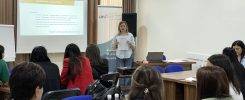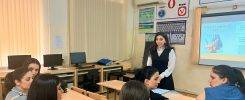Araksia Svajyan, Deputy Minister of Education, Science, Culture and Sports of the Republic of Armenia, visited the Republican Pedagogical-Psychological Center for a working meeting.
On May 15, 2025, a working roundtable meeting was held at the Republican Pedagogical-Psychological Center, headed by Araksia Svajyan, Deputy Minister of Education, Science, Culture and Sports of the Republic of Armenia, with the directors of the RA Territorial Pedagogical-Psychological Support Centers and the RPPC staff.
Welcoming the attendees, A. Svajyan presented the processes and challenges implemented in the education sector. In this context, Mrs. Svajyan addressed the activities carried out by TPPSC, the problems that arise during the organization of inclusive education, and their solutions.
The Deputy Minister expressed her concern regarding the increase in cases of violence in schools. She attached importance to the involvement of the Territorial Pedagogical-Psychological Support Centers in preventing and overcoming violence, from the perspective of the activities implemented to raise the awareness of teachers, the parent community, and students, as well as to ensure a violence-free learning environment. Mrs. Svajyan also spoke about the development of school safety standards and the processes outlined in this regard.
Reference was made to the framework of activities carried out by the TPPSCs, the resulting challenges and encountered obstacles, as well as the analyses regarding the alignment between the planned future workload and available resources. The need to ensure an accessible physical environment and reasonable adaptations in educational institutions in terms of the full inclusion of students and the effective organization of the educational process was emphasized.
Mrs. Svajyan also spoke about the “Resource-Classroom” Pilot Program implemented by the Republican Pedagogical-Psychological Center, highlighting the effectiveness of the Program and the possibilities of its expansion in other schools in Armenia. She also addressed the challenges related to parenting skills: “Parents are the most important link in this process, and we have a serious issue with parenting, not only with parents of children with special educational needs, but also with parents of all children.”
The planned digitalization processes in the field of inclusive education were also discussed. According to the Deputy Minister, this year, for the first time, the relevant regulation will be implemented, according to which children over 6 years old must attend a class appropriate to their age. Exceptions will be made only for those children with special educational needs who have intellectual developmental disorders, particularly those with severe and profound impairments. “For example, if a 7-year-old child from the above-mentioned group has not attended school, they will undergo an assessment of special educational needs at the Territorial Pedagogical-Psychological Support Centers. If an appropriate conclusion is issued, the school will be able to enroll the child in the first grade. Parents simply need to go to the school and submit an application.” The timeline for implementing the above-mentioned changes will also be discussed when planning the upcoming academic year.
A. Svajyan emphasized the importance of cooperation between TPPSCs and school pedagogical-psychological support teams, which is aimed at ensuring pedagogical-psychological services in the process of fulfilling the realization of children’s education and socialization.
Directors of the Territorial Pedagogical-Psychological Support Centers raised issues of concern to them, and made suggestions arising from the situation.
15․05.2025






